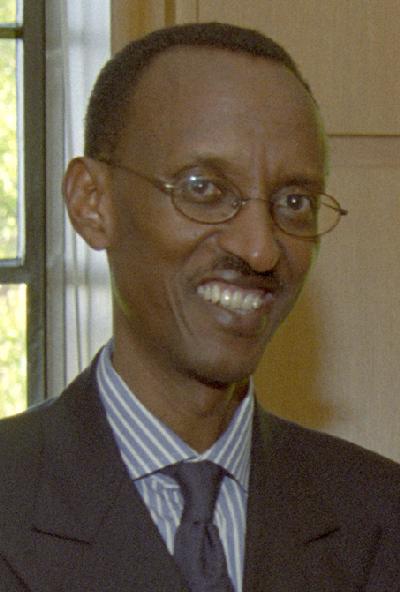April 29, 2004
Controversial Rwandan leader speaks at UW
President Paul Kagame of Rwanda told a Kane Hall audience last week that his nation is making progress in its recovery from genocide, poverty and AIDS — a quest with UW connections.
The UW is closely involved in efforts to relieve suffering in Rwanda, President Lee Huntsman said Thursday in welcoming the East African leader to campus.
A decade ago, amid the slaughter of hundreds of thousands of Rwandans by Hutu extremists, relief projects for refugees fleeing the genocide were overseen by Marc Lindenberg, then senior vice president of CARE. Lindenberg went on to lead the UW’s Evans School of Public Affairs as dean until his death nearly two years ago.
“Marc often spoke to us here on campus of how important it was to stay engaged with those who were suffering,” Huntsman said, “to reach out, learn how to prepare for humanitarian disasters and promote economic development and respect for human rights.”
The UW’s Marc Lindenberg Center for Humanitarian Action, International Development and Global Citizenship — which supports service and research in the developing world — hosted Kagame’s campus visit.
Also welcoming the Rwandan leader was one of Lindenberg’s students, Kimberly Hall, who after graduating in June will work for an AIDS treatment program in Rwanda with Catholic Relief Services.
Joining Kagame at the podium was Chris Elias, a UW Master’s of Public Health graduate who now is president of the Seattle-based Program for Appropriate Technology in Health (PATH), which has pioneered anti-disease programs in the developing world.
Campus connections aside, the Rwandan president came to Seattle at the invitation of Rob Glaser, founder of RealNetworks. The Glaser Progress Foundation supports health projects in Rwanda and announced during Kagame’s visit a $1.5 million donation to spur more efforts on behalf of the estimated half-million AIDS sufferers there.
Plans for Kagame’s 10-day U.S. visit, around the 10th anniversary of the genocide, were marked by controversy with the release of a French police report in February accusing Kagame of having ordered the rocket attack that triggered the mass killing.
France had been the main backer of then Rwandan President Juvenal Habyarimana, a Hutu, when his plane was shot down in 1994, triggering weeks of slaughter in which an estimated 800,000 people died, most of them Tutsis and moderate Hutus.
Kagame, who at the time was head of the mainly Tutsi rebel Rwandan Patriotic Front, vigorously denies the accusation that he ordered the plane attacked as a groundless “fantasy” promoted by the French to distract attention from their own culpability in the bloodshed.
Many Africa experts praise Kagame’s steps toward democracy, and he has received honorary degrees and awards from international organizations. His U.S. visit, which included Boston, Chicago and other cities, was marked by warm receptions and pledges of support for Rwanda’s economic development, health and national reconciliation efforts.



